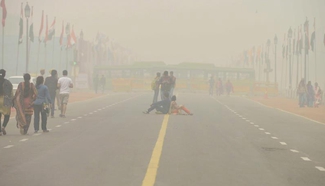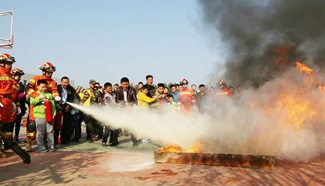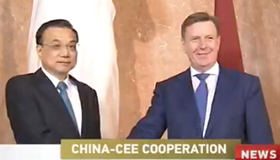SAN FRANCISCO, Nov. 5 (Xinhua) -- A review of the way carbon offset credits have been used internationally to reduce carbon emissions suggests that the program needs independent monitoring, as it is now subject to inaccurate self-reporting.
The research, led by Amy Pickering, an engineering research associate at the Stanford University Woods Institute for the Environment's Program on Water, Health and Development, examined a carbon offset program involving distribution of water filters in Kenya and found inaccuracies in self-reported data.
"Our message to recommend independent monitoring of greenhouse gas emission projects is especially timely considering global ratification of the Paris Agreement has reached the threshold needed for the agreement to go into force," said Pickering, who co-authored the study submitted to Environmental Health Perspectives, a peer-reviewed open access journal published by the U.S. National Institute of Environmental Health Sciences.
The Paris Agreement, an international climate change pact that includes provisions relating to carbon markets, went into effect on Friday, Nov. 4. As agreed to by delegates at international climate talks, implementers of carbon offset programs are allowed to collect their own monitoring data to be used by certification organizations to determine how many carbon credits they should be awarded. They can then sell their credits and profit from the programs.
Curious whether organizations are estimating their offsets accurately, Pickering and her colleagues analyzed one such carbon offset effort in Kenya's Western Province, known as LifeStraw Carbon Credits, under which the Vestergaard Frandsen company distributed for free more than 800,000 carbon-based drinking water filters to rural households. The idea behind the program is that water filters help households avoid the need to burn fuel to boil and purify water, earning carbon offset credits for Vestergaard.
Under the rules of the voluntary carbon trading market, the company could use its own data to quantify the amount of carbon its program offset and, therefore, the number of credits it had earned. In generating baseline data, Vestergaard calculated the amount of emissions theoretically released from households that would ordinarily boil drinking water if they had access to sufficient fuel and resources. It earned Vestergaard nearly 4.5 million credits during a 32-month period ending in January 2014, which the company could sell in the market or on its website for 12.95 U.S. dollars each.
Headquartered in Lausanne, Switzerland, and initially a uniform maker in 1950s, Vestergaard now claims to be a manufacturer of public health tools for people in developing countries. It is best known for inventing the LifeStraw water filter and the PermaNet mosquito net.
Pickering's team found that only 19 percent of households reported continued use of the free filters 2 to 3 years after receiving them - four times fewer households than reported by Vestergaard's internal monitoring. Of the households Pickering and her colleagues surveyed, half reported their filters were not working after 24 to 36 months. When asked about issues preventing use of LifeStraw, 35 percent of households that received a filter said it was too slow or took too much time, 17 percent said it was blocked or not working, 8 percent said it had a bad smell or taste and 7 percent thought the filter was bad for their health.
Acknowledging that carbon financing could be a financially sustainable tool for scaling up water treatment and improving health in low-income settings, Pickering and her co-authors conclude that no one can know for sure without third-party monitoring.
Katharine Mach, a senior research scientist at Stanford's School of Earth, Energy & Environmental Sciences, was quoted as saying in a news release from the university in northern California on the U.S. west coast that carbon offset programs are relatively new, and many need to be adjusted over time in order to ensure they are effective. "As we experiment with new approaches to climate responses, learning will be an essential part of the picture."










